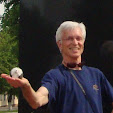I want to tell you a little story, but before I can tell it, I need to set the stage.
When I was getting to know a chatty and precocious kid in 1998, she asked me to tell her my most embarrassing moment. I thought a bit and replied that it would be hard for me to answer because I don’t embarrass easily. That’s generally true, though it’s not because I don’t do stupid things. It’s just that I don’t notice my stupidity until much later. I have a few memories that make me cringe and whistle whenever I think of them. I’m about to tell you one of them.
I’m acutely aware of my embarrassing failure because I’ve been listening to a lot of Lionel Hampton music lately. Just about every day I listen to a few of his recordings, as I am right now. He’s become my favorite musician, or at least one of two. (I love Duke Ellington too.) After some years of listening to Hampton, I got curious to read a little about him, and came to suspect that he was the subject of my story. Now that I am reading his autobiography, there is no doubt. I met Lionel Hampton around 1980.
I had recently moved to Massachusetts and started volunteering as an usher at church. I am a Christian Scientist, and the Mother Church of our denomination is here in Boston. Lionel Hampton was a Christian Scientist too, but I didn’t know that. I had no idea even who he was: Jazz music had not come up on my radar at all. One cold Sunday morning, a big car pulled up to my door. Our church has an underground parking garage, and nobody ever parked on the plaza. In my mind, somebody was taking a major liberty.
The driver let out a tired-looking African-American man in a camel-hair coat with fur collar. The man didn’t say much. He seemed out of place to me, and I imagine today that he felt my discomfort as he scuttled past. This is all so painful for me to recount: I had never been around a prosperous person of color, and couldn’t connect with him at all. I imagined that he was an old-time blues musician, wasted after a life of dissipation. More likely, he was just tired after working late and then getting up early for church. According to Ahmad Jamal, getting any jazz musician to do anything before noon is a very big deal.
I invited the driver to park in the garage and come inside, but he preferred to stay out in the car on the plaza. He waited by my door, the engine running.
As soon as the service was over, my guest was the first person down the stairs, apparently eager to go. Knowing that I had done a bad job of connecting with this man, I tried to engage him in conversation, learning only that he lived in New York. He hustled out to his car.
Unaware that I'd ever met Hampton, I heard him live in 2000 or 2001. He was one of the headliners in Bending Towards the Light, a Jazz Nativity. Supposedly one of the Three Kings, he had not performed in any of the previous shows due to poor health, and the usher warned us that he may not play tonight either. When it came time for the Three Kings, however, a vibraphone appeared on stage and an assistant accompanied the great man out. He leaned heavily on his escort, and tottered a bit before catching his balance in front of his instrument. He picked up a pair of mallets and began to play. Not quickly, not a lot of notes, but oh my, did he play! He didn’t just play the notes: the spaces between them said just as much as the notes themselves. I cried. It was pure soul. This must have been one of his last public performances, but his music lives on brilliantly. Here's a clue for you, what it felt like.
I’m sorry I can’t meet him today. I’d tell him that I love his music, but also that I admire his life, respect the way he thinks, and could hardly put down his autobiography.




No comments:
Post a Comment
Note: Only a member of this blog may post a comment.